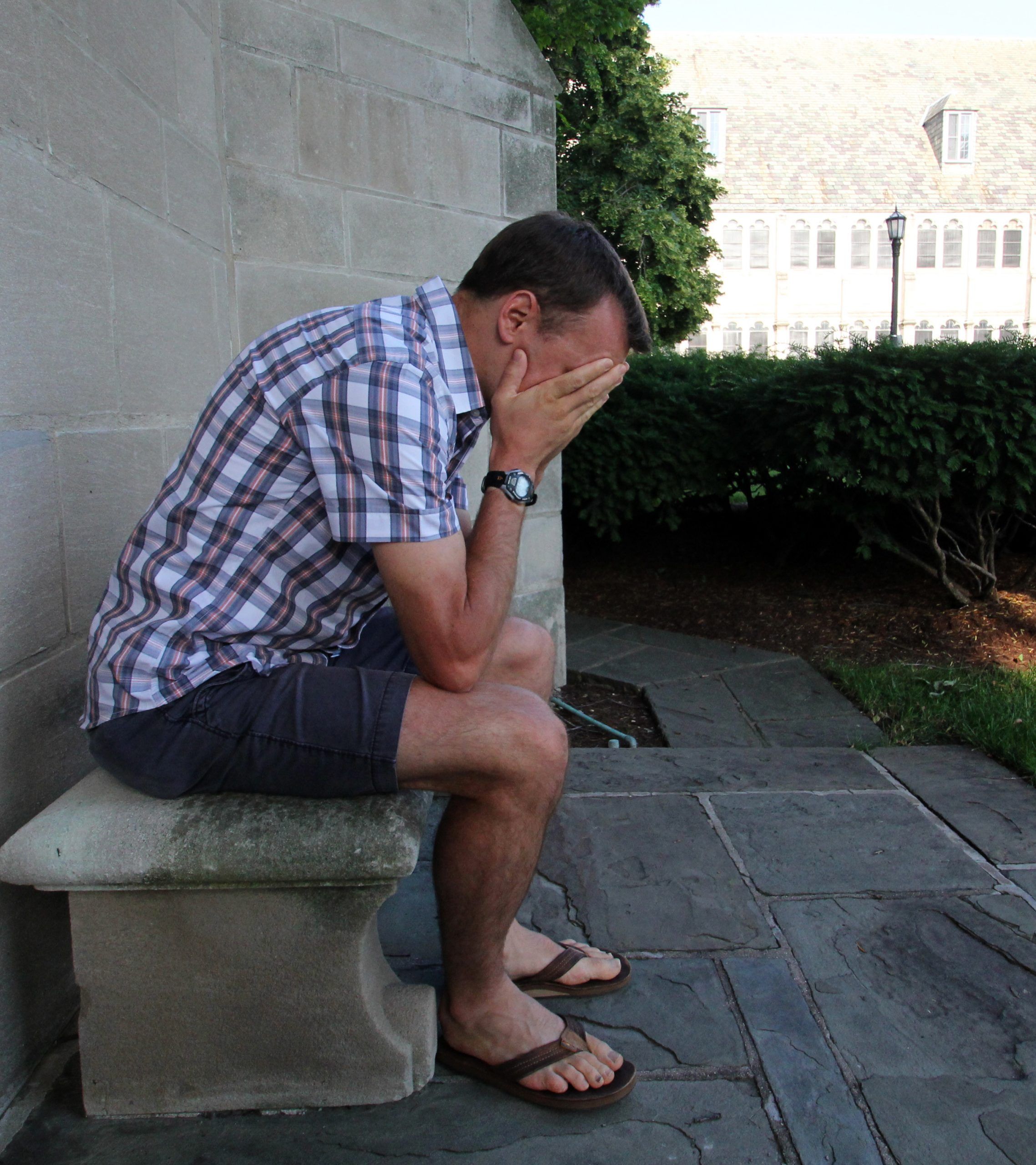20. Overcoming Sexual Anxiety and Dysfunction For Women with Kelly Ehlert, PT

Discussion with Kelly Ehlert, PT, DPT, OCD, COMT, CDNT. Kelly is a Pelvic Floor Physical Therapist who works with women experiencing pain during sex. Kelly also opens up about the issues she experienced after giving birth to her daughter.
- Different messages about sex that can trip women up (moral, medical, media)
- Common sexual issues in women
- What is pelvic floor physical therapy and how can it help women?
- Connection between stress (fight/flight/freeze response) and desire
- Why we’re all normal in our own way
Kelly’s PT practice: Priority Physical Therapy
Book: Come as You Are
See more:
Supporting Your Anxious Spouse
Transcript of Episode 20
Hope for Anxiety and OCD, episode 20. If this is your first time with us, we are all about reducing shame, increasing hope, and developing healthier connections with God and others. You can find us online anytime www.hopeforanxietyandocd.com.
Today’s show has a special disclaimer that it may be distressing for some listeners and if you have little ears listening you may want to stop the recording and pick this up at another time when there aren’t children in the room. I have an interview to share with you that I did with Kelly Ehlert. We talk about something that I believe the church doesn’t talk enough about and that is sex.
Sex is an amazing and wonderful thing, but a lot of times there are mixed up messages that we receive from a variety of sources. We’re going to talk about those on the show, and we’re also going to talk about sexual dysfunction for women specifically. What happens when things go wrong in the bedroom? What do you do about it? How to get help and hope for these situations. Kelly was open enough to share some of her personal story which I think just adds to what she does professionally, which we’ll get to a little bit later. So let’s dive into the interview.
Carrie: Today on the show, we have Kelly Ehlert, and we’re going to get into what you do a little bit later. We’re going to maybe leave people in suspense for just a little bit to have this conversation about some of the messages that we receive in the media about sex through watching TVs and movies, but also in the church. Some of the conversations surrounding sex and baggage that women specifically can have from some of those messages and also experiences with sex maybe that weren’t positive because not everybody has a stellar, positive experience with sex.
Do you want to talk a little bit, maybe about your background or your experience like in the church, just in general and then surrounding these messages?
Kelly: Yeah, thanks for having me. I grew up really conservative. I grew up at Church of Christ. I grew up outside of DC, so not quite the Bible belt but where sex was off the table. You did not do that till you got married. I heard things on the bus and behind the bleachers. You hear all sorts of things I don’t think I quite understood until later. I will say my mom was a nurse and I remember asking her about a blow job and why would somebody like that. I remember asking things, I don’t think I felt particularly shameful, but I also didn’t know what to ask or why certain things were. I went to Lipscomb. My husband and I met and we waited to get married. A lot of his background I think was the same. You meet, you wait, and then you figure it out when you get married. It’s kind of what we were joking about. We’re supposed to know what we do once we get married. There’s some magical thing that happens and your brain and your body know exactly what to do and in reality, it’s kind of a learned thing. Some of it to Nate there’s arousal, and there’s a certain procedure that your body goes through, but I think as women, ours depends on context a lot more than I think we realized.
Carrie: I think my messages were similar. I had messages in the church that were no, no, no until you get married and then somehow when you get married, it’s kind of like, “well, you know, sex is good.” All of a sudden this whole thing that I built up this idea around that maybe it was bad or shameful, or just not even knowing what to expect. And then all of a sudden it’s like, “woohoo” your wedding night’s supposed to be amazing and everything they’re following. And I had a really hard time in my first marriage trying to make that shift and switch of even seeing myself as a sexual being. I didn’t. And then from the school system, there was a lot of fear messages around sex and a lot of anxiety, like you could get an STD, you can get pregnant, something awful is going to happen to you if you have sex. So there was not really a lot of positive lingo about some of the things that we want to talk about, like God created us, women and men, as sexual beings. I had someone tell me when I was newly married, they said,” yeah, our parents talk about sex was kind of Adam and Eve figured it out and you can too.”
Kelly: And there’s so much more than that. It should be so much more and I think opening the conversation up earlier with your partner, your spouse rather than later is more beneficial. We have to be enlightened to the idea that communication needs to happen. I think we just assume. We put our assumptions on them when you know my husband and I’ve talked through quite a bit, I’m a physical therapist and we’ll get into some more of that, but I had a lot of issues after I had my daughter and there were several things that, the things that I didn’t like about myself, he had to tell me, “Kelly, I don’t care” or “I still love you despite that.” So I think a lot of the things kind of what I said a minute ago about the context is we sabotage ourselves, assuming that what we don’t like about ourselves is something that they pick apart when in reality that may be something they enjoy about us, or it may be something they don’t even think about.
Carrie: It’s not like even on the radar, one of the things that bothers me about movies and TV shows is there’s this idea or this message that you can just hop into bed with anyone at any old time and have great, amazing sex. It doesn’t matter if you haven’t known them before today, you can have amazing sex that evening, and you’re all wrapped up in the sheets and it’s wonderful. I think that puts a lot of pressure on people to feel like, okay, so then what happens if it doesn’t work that way? For me, what happens if I start to, maybe there’s something wrong with me that I’m not able to do this thing that I feel like everybody else is engaging in and they’re having a pleasurable experience. So let’s talk a little bit about some of the common sexual issues that women face.
Kelly: Okay. I guess in my field, when I get folks is more postpartum, because I think that’s when people around that area, even if it was an area that was very secluded, you have a baby and all of a sudden everybody’s messing with your stuff.
And so it makes it okay to, to kind of get things checked. So generally I see postpartum pain with intercourse, either penetration, just that initial touch and even deeper. I’ve had some it’s called vaginismus where it’s like the vaginal canal and even everything around it, it’s almost like it shrinks up or tightens up. So anything around that region that whole vulvar region gets super sensitive to touch and a lot of it’s kind of mental with it too, because the body knows it’s going to hurt. So if anybody messes with anything or even just sitting the body tends to cringe and further feed into that. So we’ve got to work usually with one of you guys, a counselor to work through some of the why. And I’ve seen fractured tailbones postpartum where the pelvic floor is attached to the tailbone and it hurts with intercourse that way. I guess mainly kind of to answer your question, I see a lot more pain-driven issues and then the causes can be different, but there can also be a lack of orgasm if the pelvic floor is really, really weak and orgasm is just a contraction of the pelvic floor. So there’s less sensation. The less sense of you that feels good and so if it doesn’t feel good, then why do it? And we kind of go down that rabbit hole, but I’d say the biggest factor and what statistically we see is just a lack of desire due to stress. Your body’s chased by a lion all day long. I wouldn’t want to have sex, but it’s still in that stress mode. And I think all of us can identify with that over the last year where we’re just not in our typical state of mind and workplace.
Carrie: So tell us a little bit about what you do and then we’ll talk a little bit further about those responses in the body.
Kelly: As a physical therapist, my background is an orthopedic physical therapist. I’m board certified in that. So anything neck, backs, jaws, shoulders, any kind of joint, but then also with my kids, I went down the women’s health path. So that’s an extra coursework to look at the internal aspect of the pelvic floor and the pelvic floor is just the insides of your pelvis. So it’s the muscles that help control your pee and your poo.
It’s the muscles that allow you to have pleasure with sexual intercourse or anything around that. It’s the muscles that help stabilize your pelvis and it’s the group of muscles that also help you kind of support all your organs up and in. So this part of our body, I never realized how important it was.
And I think it’s just a part of our body that I appreciate a lot more after having kids. But when you realize what it does for us, it’s amazing. You don’t realize when something is working well, how much it does until it stops working and you start noticing leaking or pain or heaviness or issues with jumping, that kind of stuff.
Carrie: That makes a lot of, a lot of sense. So do you usually get referrals from say OB-GYN who know that their patients are having issues and they would benefit from pelvic floor physical therapy?
Kelly: Most recently, I started off more cash pay model. We’re starting to delve into some of the insurance, but most of my clients find me through word of mouth. I have very few referring practitioners. If they are then it’s Kairos and Pilates and massage therapists because they’re dealing with that population. And honestly, a lot of us, I think our generation, the thirties and below are a lot more proactive, so there’s a lot more looking and searching. And this topic, this conversation is way less taboo than the generations prior to us. So I think most of my ladies have found me because they’ve asked questions or they’re on Instagram. So, yes and no. I would say a lot more word of mouth in the last six, eight months span like general providers, like orthopedists and that kind of thing because I am a smaller practictioner but yes, that in the bigger groups, that’s where they get a lot of their clients.
Carrie: How do people know if they might be a good candidate for this type of therapy?
Kelly: So there’s actually a really good screen that I have on my website. Anything from pain with prolonged sitting, sciatica pain with intercourse, like we mentioned, any leakage, even like abdominal pain and discomfort.
If you have constipation, all that pertains to the women’s health, physical therapy world. Issues with breathing. Any abdominal surgery, I think would be good because what we’re finding is there’s a high correlation with abdominal surgeries even abdominoplasties that scar can add here down. And we get, I think it’s like as high as 40% chance of bladder irritation, like bladder issues and then bowel obstructions.
So there’s a wide plethora of things that we kind of see and work on.
Carrie: Yeah, let’s kind of circle back to that. Talking about the nervous system response and this stress response that keeps us perhaps out of desire, I guess, is what you were saying like if we’re really ramped up, it’s hard for us to have a desire to engage sexually.
Kelly: I guess the best, I’m gonna bring this book up. You guys can’t see it, but there’s a book called Come As You Are by Emily Nagoski can never say her name and it’s almost 400 pages that she really talks a lot of levels on, one, know your anatomy, which is probably the biggest thing being on this side of it is if you don’t know yourself how are you going to expect somebody else to know you too.
That’s kind of first and foremost, but she talks a lot about the stress cycle and how we, how we either feed into it or how we can work out of it when your body is in that constant fight flight or freeze, or if it’s had a trauma and that’s more what’s your kind of world is, I feel like you can probably speak more to that.
Whether you recognize it or not, the body holds that trauma, or there’s usually something mechanical that occurs whether you consciously or subconsciously recognize that feeds in. So when you’re in that constant stress node, your body’s in fight that fight flight or freeze your body is in survival mode. It doesn’t need to procreate. It needs to survive. Like you said, the last thing we need is to go have an intimate moment. Now for some 10 to 20%, according to Emily’s book, that actually derives sex, like that’s a turn on for them where the rest of us, the 80, the 90% of us, that’s a turnoff when our brain is busy, we’re on that hamster wheel we can’t kind of actively, maybe enjoy and participate as much. And as a female, that’s really what there is no pink viagra because we are so context dependent. we need the sounds. We need the smells. We need the kids in bed. We need to be loved like we need all these things usually in order for that switch to really go off.
And she has a really cool worksheet in there on figuring out what turns your brakes on and what turns your kind of your accelerator on and stress for most of us is a really big break step around or where it just. Your system just dies down and that’s the last thing it kinda needs. You’ve just got to figure out how to break that cycle.
Carrie: That’s interesting because I have had women say, well, I just don’t want to, but they have a hard time maybe even being aware we’re breaking down some of these different aspects of things that keep them in that fight flight or freeze mode or they’re so used to just living in that heightened state. And I don’t know what your experience has been, but I don’t think it always has to be a sexual trauma to cause these types of dysfunctions, it can be other types of situations that were maybe chaotic in your family growing up that leads you to be in that state and that may affect you sexually.
Kelly: Even just your assumptions, kind of going back to our conversation about maybe our preconceived notions. In her book, she talks a lot about gardens like your sexuality is your garden and our society and our culture and our family puts all these little weeds in there and we have to figure out what within that garden is truly what we believe in what was planted there by however we live and whatever we live. And so I wrote this down because it kind of helps me, I guess, break things down and help me identify personally, and then professionally where I believe. So she talks a lot about there’s three types of messages, there’s moral, a medical message, and the media message. And so kind of going back to what you said is that doesn’t matter where you are, just identifying I think what your beliefs are is huge. So she talked about one of the moral messages being were damaged goods like if you have sex or you like it and you lose your virginity, then you’ve lost all value. Maybe a century-old mindset of once you give yourself away, nobody else is gonna want you. You just need to accommodate your partner. I’ve watched a movie on Netflix, it’s kind of their whole role in society is to appease the male and make him feel good. It has nothing to do with what the female’s body is wanting to do. You just check that box. And the other one is the medical model where you can cause damaged goods. Like you said, you can cause STDs and you can cause pregnancy. And it’s just very medical where you get this, then this, then you get aroused and you ejaculate and then you’re done, but there’s no emotion. And then the third message is around the media where you’re inadequate. You don’t know what you’re doing. If you don’t know 15 different ways to have an orgasm or 15 different positions in which feels good to you and your partner. You’re too fat. You’re too skinny.
There’s all these little messages that feed in too. I think what we, once again, we sometimes can sabotage ourselves. I think we take the enjoyment out of it because we assume that I shouldn’t enjoy it. It should be for him or society says, if I enjoy it, I must let, like, we put these names to it, but why is that?
And I don’t know. I don’t know the answer, I think just identifying the thought, maybe important in the beginning,
Carrie: I think a lot of times we don’t evaluate the messaging has been and so then if we have negative messaging, it’s important for us to say, “what am I putting in that’s different into my mind?” And hopefully something like this is a start to that to help people evaluate. What is it that I really believe about sex? What have I taken from the media from morally, from the church, from my family, from the kids behind the bleachers? And some of that information is way off of where we need to be.
I’m curious for you, how you shifted your thought process maybe on sex or had a more positive view of sex?
Kelly: So definitely more of a personal conversation, but I think a lot of it is going through that book. I had a lot of pain after my daughter with intercourse and telling my husband, “no.” Being able to say no, gave me more power than I think I realized I had. But then I remember asking the doctor about it and she’s like, ”Oh, well that’s just typical rub some cream on it.” And that was eight, 10 years ago before I think the pelvic health world became so popularized, I guess in the last four to five years, I would hope in the next five years, we’re the first line of defense for postpartum. They clear you and then you come to see us for anything else. But I think being able to shift that mindset of it doesn’t have to be penis and vagina intimacy. It can be anything else like sex doesn’t always have to be, and you don’t have to necessarily get off. Being able to talk through, “I just don’t want it tonight” because I think I went a long time with it. Well, he needs to initiate it like that’s just the man’s role. He needs to want it in order for me to be okay with it. And you know, I have another couple of stats here, but 30% of people are responsive,
My husband comes to me 30% of the time I respond to that, only 15% of us are like spontaneous, where it’s like, “Oh, I want sex like, let’s go get him the rest of us.” They’re like, “Oh, I kind of want it. Oh, but he’s there.” But it’s a combo of the situation. I think for me recognizing that he wants me to want him, like he likes that pursuit as well.
And massaging is good like touch. Just being able to be okay with not just jumping into bed. And maybe I was just super, super rigid in my beliefs, and it was like, you give him what he needs and get out and go rinse off. We’ve been able to talk through some stuff and then being maybe more, let’s say, more experimental, whatever, but being more open with trying different things.
Carrie: I always tell clients, and I’m curious if you agree with this from the medical side of your work. I really believe that great sex requires great communication. I mean, you have to be able to have those conversations, even if they’re hard, or even if they’re uncomfortable to be able to say, “Hey, when you do this, that feels good.” Even just language that we use in the bedroom. I like this type of wording and not that type of wording or these are some things that would be helpful for me to hear from you.” And if you’re not able to have those conversations with your partner. I just don’t think that you’re going to be able to have this expectation that it’s going to be great if you’re not able to communicate and talk about what you enjoy because different people obviously enjoy different things.
Kelly: Yeah, and that was one of my big takeaways from that book too, is everybody is normal within their own realm. We all have similar anatomy. We all have similar kinds of patterns. Anatomically we go through this typical pattern of arousal on through, but we have different things that turn us on and turn us off.
And you can’t expect your spouse or partner to know that If you don’t tell them, “Hey, when you do that, that was good. Do that again,” They have to be told that like a little kid, like they go by your vibes in your words and so the words aren’t present, then you’re not validating them or yourself.
Carrie: Where do people start If they are noticing they’re having sex maybe less and less often? And that might be a warning sign for them or what would be kind of like a good first step if they feel like their sexual relationships declining?
Kelly: I guess it would be kind of like you were saying as self-assess it. It’s situational because something else has taken that place in terms of time or the stress. There are specific sex therapists out there. I have one friend that I will refer folks to, but I don’t have anybody specific, so that may be better. I’m in kind of stepping back to say, well, I noticed this and figure out. I always like finding the why with everything within the therapy world. It’s I can work your neck out, but if it’s going to come back because you’re pastorally not correcting it, then kind of the same with this it’s I think backtracking to is it because I just had a baby and everything hurts? Is it because your kids just stressed you out and you had to go pull them out of jail and you’re in that fight-flight or freeze? Is it just because you’re tired? Isn’t it hormonal? What’s driving the bus and then from there it will be either probably finding the right practitioner to guide you in that direction.
Sometimes it’s talk therapy. Sometimes it’s an OB-GYN or somebody that can give you a hormone replacement.
Carrie: I think it’s really important in these types of situations where this can happen for a lot of different areas, but specific sexually, there may be some medical components involved and then there may be some psychological components involved. And when we’re looking at the situation, it’s hard to assess what’s medical and what’s psychological. I think it’s important for the medical community and the counseling community to really work together for us to be able to say, Hey, maybe you need to follow up with a women’s clinic or with your OB-GYN about that.
And for the medical community to say, Hey, has there been any trauma in your past, is there anything that’s been unaddressed that you feel like could be contributing to this issue?” Or do you just need some skills to learn how to calm your body down to like learn how to wind down at the end of the day?
We’re running 90 to nothing too often and so really learning those skills is a good process.
Kelly: I agree with that. I have a lot of patients that I’ll suggest things to, but nothing is going to change unless you actually try some things and the consistency, a little goes a long way. So being consistent with whatever you’re trying, give it enough time. Going back to your medical model, there’s some skin issues that can cause pelvic floor dysfunction, but that can, the skin issues can turn into cancer. So for me, being able to recognize, “Hey, this is not something that’s within my scope.
You need to go see some, you know, somebody beyond a therapist or a PT. You need to go get some medical treatments.” I think I would say most of us hopefully are able to determine some of that. We got to get a gut feeling in terms of when things are not going right.
Carrie: But what is a usual treatment length for someone that receives, um, pelvic floor physical therapy?
How long does it take somebody to go through therapy? It’s probably similar. It depends a lot on the situation.
Kelly: I would say most. So if it’s more of an incontinent. Let’s say the pelvic floor is influenced by your GI system, your endocrine system, your skin, musculoskeletal your integument. It has so many systems that cross up in, and then through that, I find that part of our body to be slower to learn than like a shoulder or neck or something that you can physically see because there are so many other little factors that go in. I usually say two to three months for kind of some of the women’s health issues.
If it’s postpartum, I’ll encourage them, a year and a half to two years for you to get back to normal, to feel normal. Not that they’re with me the whole time, but just giving them that timeline of kind of biological tissue healing, that kind of stuff. But it also does depend on do you need some psychological help. Can I physically help you here and I show you how to mechanically help your body move better but every time you’re stressed it feeds back in how do we take that stressor away or help you recognize when you feed in and in that talk therapy, I’m the catalyst and I see you a month or two, and then you go see somebody else and come back and we revisit or see a doctor. There’s a clinic in downtown Nashville called the WISH Clinic (Women’s Institute for Sexual Health) and they do quite a bit. They do pelvic floor botox, injections, trigger point injections. I’ve actually trigger point dry needled the pelvic floor. They do vaginal suppositories with valium for kind of decreasing. There’s a lot of options.
Carrie: That’s really good for people to know. I mean, even if people have had problems in the past that they find reoccurring that the growth in treatment options in this area, like you were saying has probably grown exponentially in the last five or so years. I didn’t know that they were using things like botox for that.
Kelly: Yeah, I’ve got a client right now who had endometriosis then a hysterectomy and everything just got locked up in response to I think the surgery and then all the pain prior. I’ve needled her and we’ve done some really cool stuff in terms of getting her pelvis moving. But she’s done the botox. She’s like 90, 95% better. Now it’s taken us a couple of months because it’s been a couple of year’s worth of issues we’re having to kind of delve through, but they’re phenomenal. And that just knowing the options that are on the table besides just don’t do not let somebody cut something out because it hurts that does not answer all the questions. If you have abdominal pain, do not let them do a hysterectomy without ruling out endometriosis and some of those other triggers or even pelvic floor tone can increase abdominal pain because it irritates blot like there’s so many overlapping things.
If nothing else, do not let them cut on you because scar tissue creates more pain and more attention and more adhesions like, “Can we just go down that cycle?”
Carrie: That’s really good because I think doctors are just kind of like doing their best and it’s like, well, here’s an option and there’s an option and maybe we should do this. And you go down this rabbit hole sometimes of things that like you were saying potentially may cause more problems than what you had to begin with. But I guess the message that I would want people to take away from the totality of this conversation is if you’re having issues with pain during intercourse, Hey know that you’re not alone, that other women are facing these types of issues. People aren’t talking about it. So you may feel really alone, but these are relatively common things that you see in your practice that I saw in my practice and that there is hope, and there is help and keep knocking on the doors until you get the help that you need.
Go to therapy. See how that does or go to your doctor, talk with them. Talk with them about all the different treatment options that are there for you and ask questions and keep going until you find somebody that can help you. You may not find that person on the first or second try, but you may find them, the third person that you talked to.
So keep it hopeful. I guess from a spiritual, Christian perspective, I’m curious maybe some of your thoughts about that as far as what would you tell a Christian woman who’s struggling with these types of issues?
Kelly: I have a nine-year-old and I’ve been trying to figure out how do I give her the message of your body is beautiful. God created it just for you.
You need to keep it holy like keep it to yourself, but at the same time how do I get her to understand that? She needs to know what it is like. It’s okay to look at yourself. It’s okay. That is your body. You only get one. Kind of what I said earlier is if you don’t know it, you can expect somebody else to either that getting comfortable with your anatomy. Just knowing the difference between a vulva, vagina the canal, the vulva, that whole region and knowing where your pee comes out, where your poop comes out. Knowing you have three holes down there. Knowing just what things are. And I don’t think there should be shame around touching. Guys play, I mean, my son’s do that. He pulls off on that thing all night. Well, what I’m saying that it’s acceptable. Kind of going back to the societal, men are supposed to get off and we’re just supposed to help them. I think we need to have pleasure too and we need to, I don’t know the best answer like I don’t think that masturbation is bad.
I think that’s a message that I have to personally figure out how to communicate with my daughter. That’s something my husband and I have talked about in terms of what I like and what he likes and are we okay doing separate things? Do we want that to be like, that just needs to be a conversation piece within the relationship.
If you’re single, I think it’s fine to explore. You’re not denying. The Bible talks about not denying your partner and not saying being consensual, but not denying your partner there that pleasure. I can’t think of the verse, but something to that extent. And so that’s still a grey area and I don’t have a good answer for you.
Carrie: Yeah, I think this sense of we were created uniquely by God with a purpose and God created us as physical beings as emotional beings, as sexual beings, as spiritual beings and somehow that’s all wrapped up in the same body and we have to figure out how those pieces in our work with each other. I do believe that sex is a spiritual connection when you’re married between you and your spouse and that’s a picture of our connection and our union with Christ and the church, and something really sacred and valuable and holy about sex. And yet at the same time, It doesn’t always work the way. it’s supposed to because we’re humans and our bodies are flawed and sometimes we go through surgery or childbirth and sometimes things don’t work the way they’re supposed to.
And knowing that, that doesn’t make you like, “Oh gosh, I’ve got this horrible thing wrong with me and I need to have a bunch of shame about it.”
Kelly: You’re not letting this dysfunction define you. Acknowledging it and knowing you were meant for more.
Carrie: Yeah, and kind of like keep pursuing that journey until that your sex is restored in your marriage and relationship. I think that there’s hope there.
Kelly: When you look through in Song of Solomon, I mean, he talks about her breasts. God let that be and God allowed that to be in that special and I think part of that is skewed I think, with how we grew up in terms of that, that gets twisted and it shouldn’t be that way, but my husband’s words are God made it and it’s not dirty if God made it that way.
Carrie: Thank you for sharing some really valuable information. Today I feel like there’s so much that we could go into and really just like we’re able to scratch the surface on things, but I hope that it will be kind of a springboard for people to maybe go get more education or look into some different avenues.
So since this podcast is called hope for anxiety and OCD at the end of every episode, I like to ask our guests to share a story of hope, a time that you received hope from God or another person.
Kelly: Sure, I guess kind of what got me into this field, in general, was issues after my daughter and so in terms of that riff between me and my spouse since we’re on this topic, I couldn’t enjoy him. I remember laying in the bed crying and then going like being able to go through courses to help my clients actually helped. It did more, I guess. You kind of grow as your professional relationships with your clients grow. I think that’s why I am like, sex is better because that communication had to occur.
And I was able to mechanically in my brain, went through the coursework, was like, well, that’s why that hurts because this is scarred down and for my brain, I needed the biomechanical. I need somebody to explain it to me on my level that I could. It didn’t hurt just because I had a baby, it hurt because I had scar tissue because of muscle tore and every time he went through that spot, it made it tear more. That made sense to me and I think just being able to break things down on my level gave me that ability to be like, okay, I can do something about this. This is my body. I know how to help myself and that led me down the path of all right now I have a second kid, I want to do this for other moms. I don’t want them to lay in the bed being miserable, dreading, “Oh my gosh, he’s coming. Is he going to want it tonight? Am I going to just cry again?” I want to enjoy sex. I want my partner to enjoy me. I want it to be consensual.
I want to go on a date and come home and be ravenous like the movie. Like I want it to be that way and I want my clients and my patients to be able to understand that it can. It can be that way like there’s my hope.
Carrie: That’s how empowering just to have that knowledge about your own body and why it was responding, the way that it was, and then realizing it, doesn’t always have to be this way and I can get some help and help myself and move forward.
Kelly: That’s far back in your lap and understanding. I just think like you said, keep searching. Be your own advocate. If you don’t think something’s right, we have that good gut-fixed sense as women. I think we just have something, some intuitive, something innately in us that helps us help each other, but also help ourselves. Our body wants to thrive too.
We want that homeostasis, I guess. Keep searching. If you’re getting the runaround and help, there’s a ton of us out there on social media now, that you see something you can go down that path and search a little harder.
Carrie: We’ll put links on your information in the show notes and as well as for the book that you talked about too. Thank you so much for sharing today.
Kelly: Thank you. I appreciate your time.
_________________________________
There were so many good nuggets in that interview and I hope it sparks some further thought in conversation in your mind, if you’re a woman about how can I make my sex life better for myself and for my spouse.
Do you have lingering questions from either this episode or other episodes that we’ve done on the show? If you are leaving with unanswered questions or feel like you want to know more about a specific issue I would love to hear your feedback on the show because I want to make it something that you want to continue to come listen to. So you can drop me a line anytime through our website hopeforanxietyandocd.com and I promise to read those and respond to you. Thanks so much for listening.
Hope for anxiety and OCD is a production of By The Well Counseling in Smyrna, Tennessee. Our original music is by Brandon Mangrum and audio editing is completed by Benjamin Bynam.
Until next time. May you be comforted by God’s great love for you.








